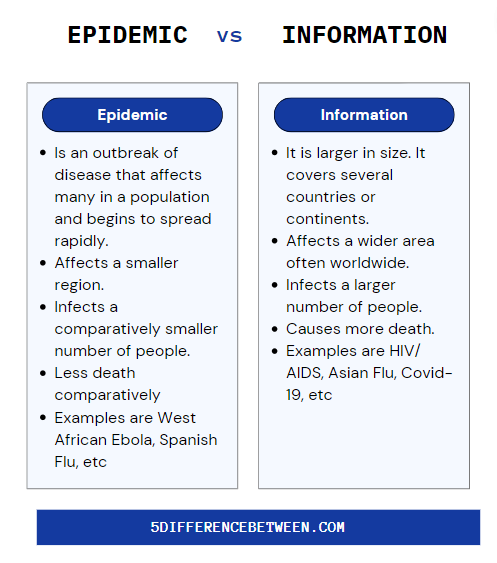An epidemic or pandemic is the rapid spread of a disease or virus. A pandemic is a disease or virus that has spread across a much larger area, usually across countries or continents. An epidemic typically affects a specific region or population, whereas a pandemic can affect a much larger population across multiple countries, making the difference between epidemic and pandemic eminent.
What Actually is an Epidemic ?
An epidemic is a large disease outbreak that spreads quickly and affects a large number of people. An epidemic can quickly spread across a large area, even across a country or around the world. It can also quickly spread within a small group, such as a family, school, or workplace. Pathogens, or disease-causing organisms, cause epidemics. Viruses are the most common pathogens, but bacteria, fungi, and parasites can also cause epidemics. Because viruses can spread quickly from person to person, they are the most common cause of epidemics.
Epidemics can strike any population and be caused by either new or existing pathogens. A new virus, for example, may emerge and spread quickly, or an existing virus may spread faster than usual. Some epidemics, such as the flu, occur year after year, while others, such as the Zika virus, are seasonal. Depending on the type of disease, epidemics can cause a wide range of symptoms. Epidemic symptoms include fever, cough, fatigue, and difficulty breathing. In some cases, epidemics can result in serious complications such as organ failure or death.
Also Read > Difference Between Psychologist and Psychiatrist
It is critical to practice good hygiene and follow public health guidelines to prevent the spread of epidemics. This includes washing your hands frequently, avoiding close contact with sick people, and getting vaccinated as soon as possible. If you notice any symptoms of an epidemic, you should seek medical attention as soon as possible. Early detection and treatment can help to slow the disease’s spread.
What Actually is a Pandemic?
A pandemic is defined as a worldwide outbreak of a contagious disease that spreads rapidly across a large population. It is caused by a novel, or previously unknown, virus or microorganism that is capable of causing serious illness or death in humans. A pandemic is defined by the World Health Organization (WHO) as “the occurrence of an infectious disease that spreads easily and rapidly across countries and continents, affecting a large number of people.”
A pandemic can have far-reaching ramifications. It has the potential to spread disease, cause death, and disrupt daily life. Governments may impose travel restrictions, social distancing measures, and quarantines during a pandemic to contain the virus and prevent its spread. Furthermore, businesses may be forced to close, and individuals may face financial difficulties as a result of job losses. Preventive measures such as frequent hand washing, avoiding contact with sick people, and staying at home when sick are the best ways to avoid a pandemic. Vaccines can also aid in the prevention of pandemics such as influenza. Individuals and communities must be prepared for a pandemic and take all necessary precautions to safeguard their health and safety.
Epidemic Vs Pandemic

Is Covid a Pandemic Epidemic or Endemic?
Epidemics and pandemics are public health emergencies that can spread quickly and cause severe illness, disability, and death. A pandemic is a global outbreak of a disease, whereas an epidemic is a regional outbreak. Both are caused by the same agents, such as viruses and bacteria, and necessitate public health interventions to limit their spread and mitigate their effects.






